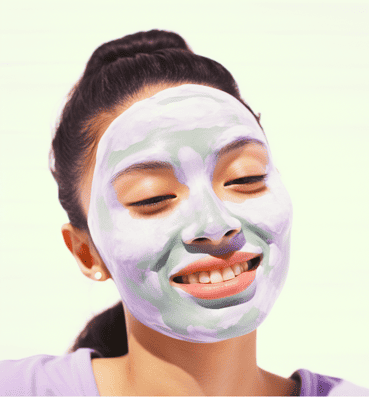
Can greek yoghurt cause acne?
Greek yoghurt may contribute to acne in some women due to its dairy content. Plant-based alternatives like almond or coconut yoghurt offer similar benefits without the potential skin issues.
ABOUT ME
Be beauty. Be plant-based!
As a former Registered Nurse and avid plant-muncher, I’m in love with how simple plant-based foods make it easy to be beautiful.

You’ll also love:
Is Vegan Protein Causing You Acne? The Ultimate Guide
In our quest for beautiful skin, we often scrutinise what we eat, especially when it comes to dairy products like Greek yoghurt. Can Greek yoghurt cause acne? This blog post delves into the relationship between Greek yoghurt and acne, offering insights for those seeking clear and healthy skin.
Is Greek Yoghurt Okay for Acne?
Understanding the role of dairy products in acne breakouts is crucial for skin health. Plain Greek yoghurt, a specific type of yogurt, is known for its healthy bacteria beneficial to the gut microbiome and gut health. However, its dairy content from cow’s milk, the primary ingredient in Greek yoghurt, will worsen acne.

Dairy is a known cause of acne and can exacerbate acne-prone skin through several mechanisms.
First, dairy products can increase insulin levels and insulin-like growth factor 1 (IGF-1), which can further contribute to acne by promoting inflammation and skin cell growth. Milk proteins in Greek yogurt could trigger inflammation, leading to acne production. This doesn’t mean Greek yoghurt is harmful for everyone, but it’s vital for acne sufferers to monitor their skin’s reaction to dairy products like Greek yoghurt.
Second, the development of acne is influenced by the sex steroid hormones naturally present in cow’s milk, especially in skim milk, due to higher estrogen levels. This influx of hormones can lead to hormonal imbalances which stimulate the sebaceous glands, leading to increased oil production, which is a key factor in the development of acne. Skim milk was found to have the most steroid hormones compared to 2% and whole milk.

Unfortunately at this time, the specific impact of different dairy products on acne (such as ice-cream, yoghurt, cheese etc) remains unknown. That said, eating more yoghurt in your diet is associated with more acne.
Ultimately, the impact varies among individuals, making it essential to observe how your skin reacts to a cup of Greek yogjurt.
The Disadvantages of Greek Yogurt
While Greek yoghurt is often hailed as a health food, it’s not without its downsides. The sugar content in some commercial yoghurt varieties can be high, impacting blood sugar levels and potentially worsening acne symptoms in their own right.

Additionally, the presence of artificial sweeteners in some yogurts can also be a concern for those seeking a healthy diet. For those with a milk allergy or lactose intolerance, even plain Greek yoghurt can cause digestive issues.
Finally, it’s well-known advice for acne sufferers to stay away from high glycemic index foods and highly processed foods, and greek yoghurt is considered to be a highly processed food. Varieties with added sugar will also be a high glycemic index food.
Applying Yoghurt on the Face: A Double-Edged Sword?

The idea of a yoghurt face mask has gained popularity as a natural skincare solution. However, for those with oily skin or cystic acne, applying plain yoghurt directly to the face can sometimes worsen acne symptoms. The dairy proteins and sugar content in regular yoghurt could potentially irritate sensitive skin or clog pores, leading to breakouts. It’s crucial to understand your skin’s needs before trying a yoghurt face mask.
Greek Yoghurt and Pore Health
While Greek yoghurt is a nutritious choice, its impact on skin health, specifically on pores, is a subject of debate. Ingredients in commercial yoghurt, including added sugars and dairy-derived components, might contribute to oily skin and clogged pores.
Sebaceous glands, which are responsible for oil production, can be influenced by the hormonal content in cow’s milk products. Understanding how your skin reacts to a cup of Greek yoghurt can guide your dairy intake decisions for maintaining healthy skin.
Delicious Swaps: Plant-Based Alternatives
If Greek yoghurt isn’t agreeing with your skin, consider alternatives like coconut yoghurt or soy yoghurt.
In breakfast bowls, plant-based yoghurts like almond or coconut yoghurt are great substitutes.
For a creamy smoothie alternative, avocado or banana can also provide similar texture, or soak a third of a cup of rolled oats in a plant-based like almond milk, oat milk or soy milk.

For soups and stews, creamy options like coconut milk or cashew cream can replace Greek yoghurt, offering both flavour and texture that complements various dishes.
These plant-based options are free from cow’s milk proteins and hormones, potentially better for those with milk allergies or acne-prone skin. They can be used in smoothies, baking, or even in making your own dairy-free yoghurt, contributing to a healthy diet without compromising on taste or nutritional value.
Troubleshooting Yoghurt-Triggered Acne
For those suspecting Greek yoghurt as a trigger for breakouts, start by eliminating it from your diet temporarily. Observe any changes in acne symptoms over a few weeks. If improvement is noticed, it could indicate a sensitivity to milk products. Reintroduce it gradually while monitoring your skin’s response. Keeping a food diary can be a helpful tool in this process, enabling you to track your dairy intake and its effects on your skin health.
Other Foods to Avoid for Acne
For clearer skin, avoiding certain foods can be beneficial. High glycaemic load foods like white bread can worsen severe acne by spiking blood sugar levels. Foods with much sugar or lot of sugar, including chocolate and even dark chocolate, can exacerbate acne. Vegetable oils and olive oil might also contribute due to their fat content. For those with a sweet tooth, opting for healthy foods is the best thing. Additionally, potato chips, spicy food, and products with high fructose corn syrup are known to aggravate acne, and limiting these can aid in achieving clear skin.
Can Greek yoghurt cause acne?
In conclusion, exploring the question “Can Greek yoghurt cause acne?” reveals a complex relationship between diet and skin health. While Greek yoghurt has its benefits, it may not be suitable for everyone, especially for those with sensitive or acne-prone skin. Considering non-dairy alternatives like almond or oat milk can be beneficial. It’s important to observe your body’s reactions to different foods, including Greek yoghurt, to maintain clear, healthy skin.
References
Video: Ultra-Processed Junk Food Put to the Test at NutritionFacts.org